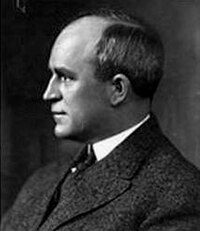George Howard Williams
| George Howard Williams | |
|---|---|
 |
|
|
United States Senator from Missouri |
|
|
In office May 25, 1925 – December 5, 1926 |
|
| Preceded by | Selden P. Spencer |
| Succeeded by | Harry B. Hawes |
| Personal details | |
| Born |
December 1, 1871 California, Missouri |
| Died | November 25, 1963 (aged 91) Sarasota, Florida |
| Political party | Republican |
| Spouse(s) | Harriet C. (Stewart) Williams |
| Children | two sons; Howard Williams Stewart Williams |
| Occupation | Attorney |
George Howard Williams (December 1, 1871 – November 25, 1963) was an American politician and attorney from the state of Missouri. A Republican, he served as U.S. Senator from Missouri from 1925 to 1926, completing the term of Selden P. Spencer following the latter's death.
George H. Williams was born in California, Moniteau County, Missouri to John Morrow and Alice Gray (Howard) Williams. His father was heavily involved in state and local politics, serving as a member of the Missouri Senate, a prosecuting attorney, and circuit judge. Following his graduation from California High School in 1889, George Williams attended college preparatory classes at Drury College in Springfield, Missouri. He then attended Princeton University, earning his degree in 1894. After Princeton George Williams taught for a short time at California High School while also studying law and clerking at his fathers law office. He went on to further study at Washington University in St. Louis, receiving his LLB in 1897. Williams was admitted to the Missouri Bar the same year, at which time he established a law practice in St. Louis, Missouri
In June, 1900 Williams married Harriet Chase Stewart, daughter of prominent St. Louis attorney Alphonso Stewart and granddaughter of Confederate Civil War General Alexander P. Stewart. The couple would have two sons; Howard and Stewart. In 1902 Williams joined the law firm of his father-in-law.
George Williams, long involved in Missouri Republican politics, was appointed a circuit court judge for the St. Louis region in 1906, a position he would hold until 1912. In that position he was a key player in developing a new juvenile code for Missouri, and took a strong interest in bettering the lives of children that lasted even after he left the court. As chair of the St. Louis Board of Children's Guardians, he helped establish Bellefontaine Farms, a home for troubled, orphaned, and abandoned children.
...
Wikipedia
